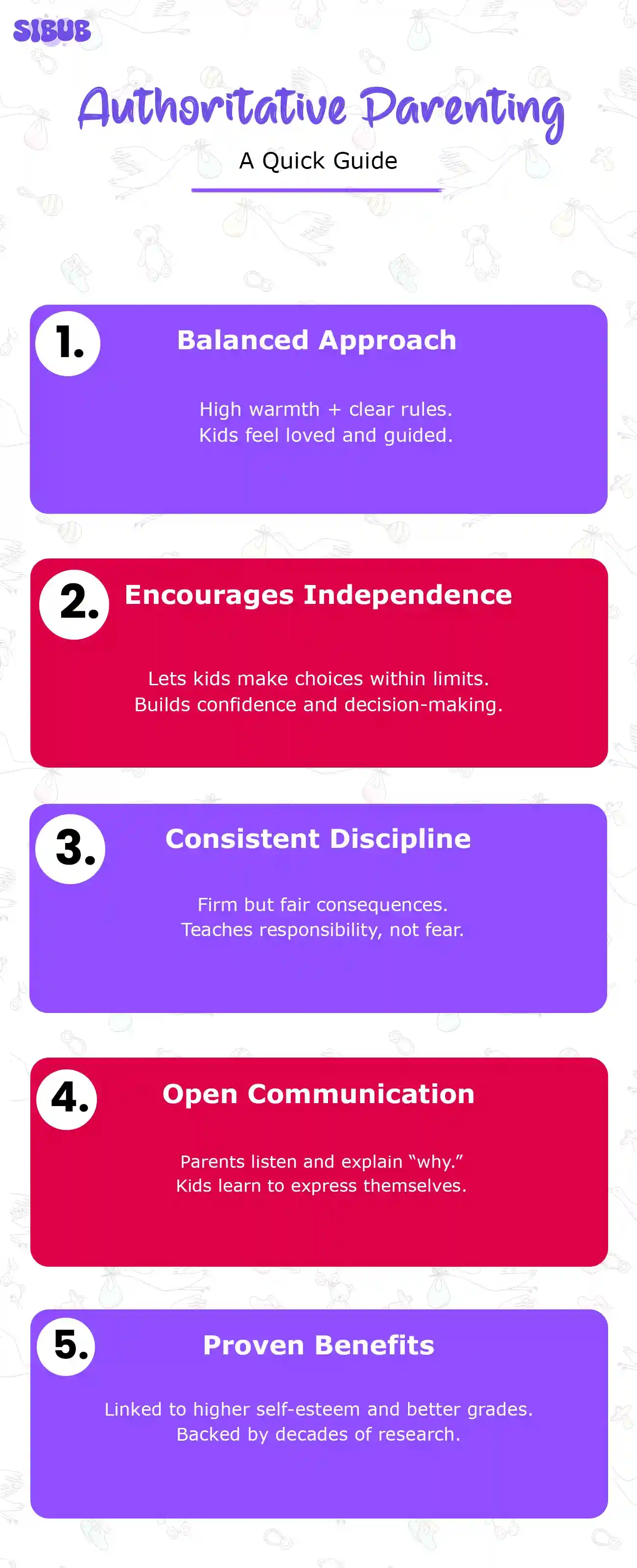Children who are brought up with authoritative parenting are believed to be raised as well-rounded, self-assured individuals who know how to be responsible.
But what makes this type of parenting so effective? How does it differ from other approaches? What does the literature have to say?
In case you searched for these and maybe “what is authoritative parenting” and tried to define authoritative parenting in simple words, this guide will help you thoroughly.
Let’s get into the details.
What is Authoritative Parenting?
Before we go further, it’s important to understand the authoritative parenting definition.
Authoritative parenting is a balanced approach that mixes warmth, responsiveness, and clear boundaries. Authoritative parents listen to their children, encourage independence, and guide them with consistent rules.
They’re not too strict. They’re not too lenient. Instead, they strike a healthy middle ground.

Discover: Nurturing Healthy Kids, Guiding Confident Parents
Authoritative Parenting: Meaning in Simple Terms
Let’s simplify it:
- Warmth: They love and nurture their kids.
- Structure: They set clear rules and stick to them.
- Support: They allow their kids to express themselves.
- Respect: They listen and value their children’s thoughts.
Unlike authoritarian parents (who demand obedience without question) or permissive parents (who set very few rules), authoritative parents raise children in a democratic environment.
Key Traits of Authoritative Parents
Here’s how you can spot or become an authoritative parent:
- Set clear and consistent rules
- Explain why rules matter
- Encourage independence
- Listen actively to children
- Use positive discipline
- Show love and affection
- Promote open communication

Children of Authoritative Parents Tend to Be…
Research has shown that children of authoritative parents tend to be:
- More confident
- Emotionally strong
- Socially skilled
- Responsible
- High in self-esteem
- Better at managing stress
- More likely to succeed academically
These kids know what’s expected of them and feel secure and loved. They also learn how to think critically and make smart choices.
Parent Styles: Authoritative vs. Other
There are four main parenting styles:
- Authoritative – High warmth, high control (the ideal balance)
- Authoritarian – Low warmth, high control (strict and demanding)
- Permissive – High warmth, low control (lenient and indulgent)
- Uninvolved – Low warmth, low control (neglectful)

Explore: When Does an Infant Get Teeth? 7 Things Parents Should Know
Let’s compare:
| Parenting Style | Warmth | Rules | Independence | Child Outcomes |
| Authoritative | High | Clear | Encouraged | Well-rounded |
| Authoritarian | Low | Rigid | Restricted | Obedient, but anxious |
| Permissive | High | Few | Allowed | Impulsive, less disciplined |
| Uninvolved | Low | None | Ignored | Poor social/emotional development |
As you can see, the authoritative parenting style creates the best outcomes for children.
Why Authoritative Parenting Works So Well
Here are some powerful reasons backed by studies:
1. Builds Socially Valued Self-Esteem
Some parenting styles boost self-esteem, but in a self-centered way. Authoritative parenting creates socially valued self-esteem. Children learn confidence with humility, not arrogance.
They feel worthy and connected to others. This balance helps them thrive in schools, communities, and relationships.
2. Teaches Real Discipline, Not Fear
Authoritative parents don’t hit, shame, or threaten. Instead, they use:
- Clear expectations
- Consistent consequences
- Positive reinforcement
- Timeouts and calm talks
This kind of discipline teaches children to regulate themselves, not just avoid punishment. It works without fear.
3. Encourages Emotional Growth
Children raised with authoritative parenting are allowed to:
- Talk about feelings
- Ask questions
- Make decisions (with guidance)
This builds emotional intelligence, the ability to handle stress, understand others, and express oneself clearly.
4. Promotes Democratic Values
Studies show that authoritative parents raise kids who:
- Respect others
- Listen and share
- Work well in groups
- Love fairness and equality
These values reflect strong social skills and help children become better citizens and leaders.
5. Supports Healthy Personality Development
According to research, authoritative parenting helps kids develop:
- Openness (willing to try new things)
- Conscientiousness (organized and responsible)
- Agreeableness (kind and cooperative)
- Extraversion (confident and outgoing)
These are traits that shape a successful and happy adult life.
Learn More Parenting Tips from our For Parents Section.
Culture and Authoritative Parenting
Not every culture raises kids the same way. In collectivist societies like parts of Asia or Nepal, parents have often followed more authoritarian styles, emphasizing obedience and control.
But times are changing.
Global studies now show that authoritative parenting works well everywhere, whether in individualistic cultures (like the U.S. or Australia) or collectivist ones (like Japan or Indonesia).
Even in traditional homes, many parents are shifting toward authoritative methods to adapt to modern challenges.
How to Practice Authoritative Parenting at Home
Want to try the authoritative parenting style in your own home?
Here are simple tips:
1. Set Clear Rules: And Explain Them
Let your child know why a rule exists. Kids respect logic, not just power.
2. Be Consistent
Follow through. Don’t say no one day and yes the next. It confuses kids.
3. Show Love Daily
Hug, smile, praise. Make them feel seen and appreciated.
4. Listen First, Talk Second
Hear them out. Even toddlers want to be heard.
5. Allow Independence
Let your kids make small choices. It builds confidence.
6. Avoid Physical Punishment
Use time-outs, natural consequences, or calm talks instead.
7. Stay Calm and In Control
Parenting can be stressful. But shouting doesn’t solve anything. Stay grounded.
Real-Life Examples of Authoritative Parenting in Action
Theory is great, but how does authoritative parenting look in real life?
Example 1: A 9-year-old refuses to do homework.
- An authoritarian parent might yell or punish.
- A permissive parent might ignore it.
- An authoritative parent would calmly ask why, listen, and then explain the importance of homework. They might help create a schedule, giving the child some control while maintaining responsibility.
Example 2: A teenager wants to attend a late-night party.
- An authoritative parent would ask questions: Who’s going? Will adults be present? Instead of just saying “no,” they discuss concerns, consider compromises (like earlier pickup), and set safety boundaries.
These everyday situations show that authoritative parenting is not about control; it’s about communication and cooperation.
What Science and Psychology Say About Authoritative Parenting
Research from developmental psychology has long supported the authoritative parenting style.
According to psychologist Diana Baumrind, who first defined parenting styles in the 1960s, authoritative parents raise the most successful and emotionally balanced children.
Later studies have found:
- Higher academic achievement in children raised by authoritative parents
- Lower risk of depression, anxiety, and behavioral issues
- Better relationships with peers and adults
- Improved executive functioning skills (like focus, planning, and impulse control)
Brain development is strongly influenced by emotional safety. The authoritative approach provides that foundation.
Adapting Authoritative Parenting in Different Cultures and Families
Every family is different. What works in one household may need tweaking in another.
Good news? The core of authoritative parenting, love + structure, fits in almost any cultural or social setting. You just have to adjust the how, not the what.
Examples:
- In large families, older siblings may help enforce rules with guidance.
- In joint family setups, multiple adults may co-parent; consistency and communication are key.
- In modern urban families with working parents, routines and quality time become especially important.
The authoritative parenting meaning remains the same. Children thrive when they feel safe, respected, and guided.
Common Challenges (and How to Overcome Them)
Even authoritative parents face tough days. Here’s how to deal with some common bumps on the road:
Child Doesn’t Listen?
Stay calm. Repeat expectations. Use natural consequences (e.g., “If you don’t clean up your toys, we won’t have time for a bedtime story.”)
Feeling Guilty After Discipline?
It’s normal. But if you’ve stayed calm, explained the why, and offered love afterward, you’ve done it right.
Struggle With Consistency?
Create routines. Write down family rules. Involve your child in setting them. This builds ownership and teamwork.
Every parent slips up! What matters is returning to the values of authoritative parenting: respect, balance, and love.
Legal and Ethical Support for Authoritative Parenting
Authoritative parenting aligns with child rights laws across the world.
For example:
- The UN Convention on the Rights of the Child protects children from violence and supports positive discipline.
- In Nepal, laws prohibit corporal punishment, even at home.
- Parenting is legally seen as a responsibility of love, care, and guidance, not control or punishment.
Therefore, Choose the Authoritative Path
So, what is authoritative parenting in the end?
It’s a loving, structured, and respectful approach that raises children who are:
- Kind
- Confident
- Responsible
- Emotionally strong
The authoritative parenting style is more than a theory. It is a practical, evidence-based guide to raising complete human beings.
If you’re wondering which of the parent styles is best, the answer is clear. Authoritative is the way to go.
Start with small changes. Be present. Set boundaries. Offer love. And most of all, listen.
Because the best kind of parent doesn’t just raise a child…
They raise a whole person.
